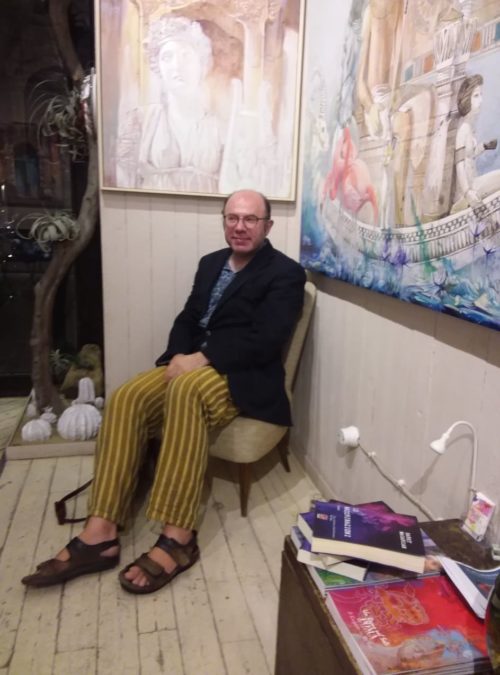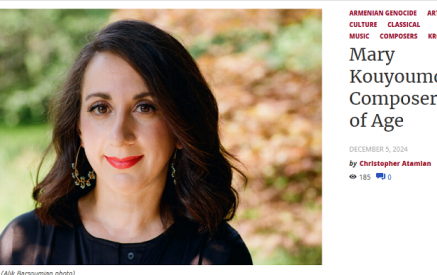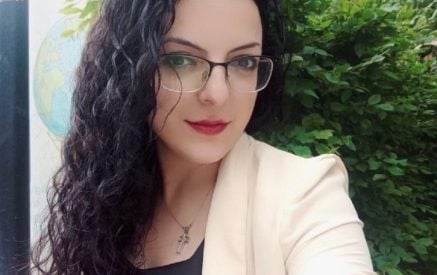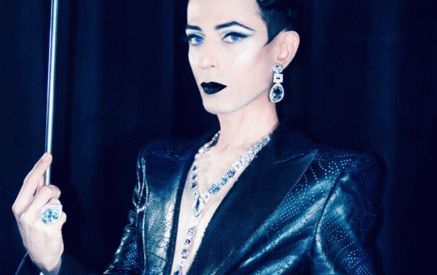YEREVAN/FLORENCE — Writer and composer Baret Magarian was born in London and currently lives in Florence. He was educated at Durham and London Universities. Magarian has worked as a translator, musician, interviewer, journalist, lecturer, book representative and in PR.
In London, he was a freelance journalist, published fiction in many magazines, wrote book reviews, features, and articles which have appeared in all the major British broadsheets.
Read also
He began his career by writing features and reviews for The Times, The Guardian, The Observer, The Independent and The New Statesman, then published fiction in World Literature Today, Journal of Italian Translation, the online magazines El Ghibli, Sagarana, and Voyages. His poetry has appeared in the Florentine magazine Semicerchio and the Australian anthology Contrappasso. Magarian has published four books: The Fabrications (Pleasure Boat Studio), Melting Point (Italian translation, Quarup), Mirror and Silhouette (Albion Beatnik Press) and Chattering with all my favourite Beasts (Italian and English, Ensemble). He has recorded an album of acoustic rock, composed and performed piano music in the vein of Alkan and Jarrett, and recently staged his monologue “The Pain Tapestry” in Florence and Turin to great success.
Dear Baret, I highly enjoy interviewing people with versatile background and activities. Perhaps you can understand me, yourself having interviewed interesting people, among them such diverse figures as Peter Ustinov, John Calder and Salman Rushdie. What do you like more in that process?
I like the whole process of interviewing a person: the research and preparation, the actual interview, the audience participation, if there is any — depends on whether the interview is conducted in private or public or is written (like this one) or aural/recorded and the publication of the interview (if it does get published). The key to revealing the person lies, I believe, in demonstrating absolute respect for the interviewee (through the tone of voice, through body language) and in allowing the interviewee to speak absolutely freely, with no restrictions, no aggression on the part of the interviewer and no hidden agendas. It is important also to try and avoid any kind of psychological guessing/deducing: one’s own insights are nearly always wrong. There is a tendency for all media people to assume they know the truth about a person that they have worked out the real facts. This is erroneous. They were not there when the interviewee’s life was unfolding, so they can never know what it was really like to live those events, and to be that person. Of course the gifted interviewer can indeed have certain insights, even brilliant ones, but one must always be careful not to seem too clever, presumptuous or arrogant.
I mostly share your attitude about interviewing people. Florence always has attracted the British and other writers from all around the world. How Florentine inspirations are reflected in your literature?
To be honest Florence plays hardly any role in my writing. The city is fascinating and dazzling, maddening and mysterious, elegant and inscrutable. But I never write about it directly.
And now this highly picturesque city you experienced the same hardships along with all of mankind. In your writing The Italian Quarantine I liked this quote: “Florence has become like a colossal movie set, after having been abandoned when the production money didn’t come through, an open-air theater for no one.” And now?
Now Florence has more or less returned to normality, the shops and bars are all open again, the Florentines buzz around on their scooters, the tourists are back, but depleted by about 75 percent, and the wine is flowing freely. And yet the presence everywhere of masks, the obsession with hand hygiene, the queues outside restaurants and post offices reminds us that normality has not quite returned, and that we are all a little bit closer to our own sense of mortality, and life’s ultimate mystery and fragility.
A writer friend of mine once said that the solitude is the writer’s best friend. Do you agree with this?
Solitude is necessary in order to write I think, but solitude in too great a dose is contaminating, damaging, like too much sunshine, or too much sponge cake.
You identify yourself also as a fringe theatre director and actor. It will be interesting to learn what kind of projects you have been in.
I directed my own three-hour play at university that was a wonderful experience. I also directed some cabaret in London, at a great pub theatre in Little Venice, with songs by Kurt Weill, Johnny Mercer, and others. I also directed Moliere’s “The Misanthrope” in the Middle Temple Gardens. In Florence and Turin I directed the wonderful Italian-American actor Roberto Zibetti in my own monologue “The Pain Tapestry,” which he also performed in French in Pornic. The same piece was also staged in Iceland, with Pall Palsson performing — finally — in English. As an actor I mainly have done small roles in videos and film trailers, most interestingly for Alessio della Valle in “Max Fortuna.” That was a great experience — but a bit scary, as I had to play a mechanic whose role mainly took place under a car. I kept worrying that the car would fall on top of me!
Your biography says that you worked, among other things, also as a nude model. What is that experience like?
I found nude modeling to be absolutely fascinating. To me it was like taking some kind of hallucinogenic drug. I was aware of myself splitting into two: the me on the podium as the model, and then the me who was able somehow (because the experience was so intense and unreal) to observe myself standing on the podium. To make things even more complicated I was also able to inhabit the point of view of the artists who were drawing me. So the whole thing was extraordinary and magical, like an out of body transcendent experience, like a mirror reflecting into another mirror… I am very glad that I did it, but I wouldn’t want to do it now – my stomach is too big.
Review 31 once wrote about you: “Magarian’s authentic poetic voice is strangely addictive, articulated with a shamelessly exotic accent.” Can this “exotics” be ascribed to your origin?
Yes I am pretty sure that is the case. My Armenian roots account for the exotic flavor to my writing and its dense sense of sensory richness.
I have listened some of your piano and guitar pieces. Some critics have mentioned that your music draws on the tonalities of Armenian music. How so?
Well, I have never studied music formally and I am essentially self-taught as a pianist but I love certain pieces by Khachaturian, by Gurdjieff (in the transcriptions of de Hartmann), and by Tigran Hamasyan. These pieces and their rich, pungent tonalities I love very much and I think they have seeped into my own piano pieces. I instinctively feel certain keys I use are very close in character to the rich sentimentality and nostalgia that I sense in the music of the Armenians that I mentioned.
And generally, have you any idea about your ancestors and their native region?
My mother’s father Hovaness was the Armenian priest of Nicosia. His family had settled in Syria after the genocide, but then, on the threat of the Turkish takeover of Syria (as encouraged by the British) in 1939 he moved to Nicosia. My mother’s mother Hosanah assisted my grandfather as a kind of social worker there, helping the needy and poor. My father was born in Nicosia, and his parents had settled there after the genocide. My father and mother met there and decided to emigrate to England in 1960. I was born there eight years later. Unfortunately I don’t have much knowledge of the time before that. Maybe one day I will look into my history more carefully. As a child I always felt that everything was shrouded in mystery and the unknown when it came to my family – I suppose because the events was so close to the tragedy and horror of the Armenian genocide. I wish I could have spent more time with my grandparents. I never even met my mum’s mother – it’s so sad.
Italy always has had not a large, but significant Armenian presence. I know three Armenian artists living in Florence. Have your paths ever crossed with Armenians in Italy and in general?
Sadly I haven’t really met any other Armenians in Florence, though recently I did go to a mass at San Miniato (who was of course himself Armenian) and I met some Armenians then. I would like to spend more time with Armenians actually. And recently I met an Armenian sculptor in Pietrasanta.


























































